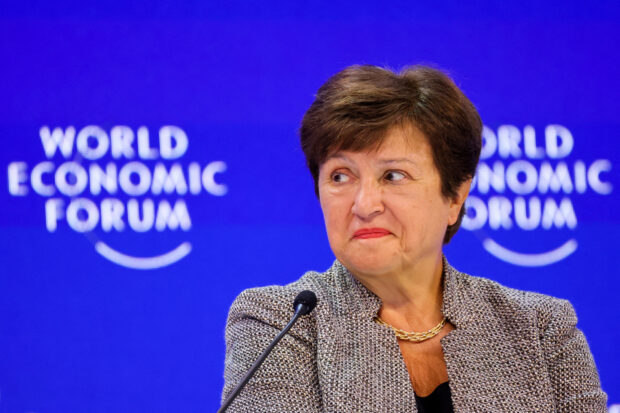IMF’s chief says Mideast growth to slow in 2024 on oil cuts, Gaza

International Monetary Fund (IMF) Managing Director Kristalina Georgieva attends the 54th annual meeting of the World Economic Forum, in Davos, Switzerland, Jan 17, 2024. REUTERS/Denis Balibouse/File photo
DUBAI -The International Monetary Fund said on Sunday Middle East economies were lagging below growth projections due to oil production cuts and the Israel-Gaza conflict, even as the global economic outlook remained resilient.
Despite uncertainties, “the global economy has been surprisingly resilient,” IMF managing director Kristalina Georgieva told the Arab Fiscal Forum in Dubai, while warning of a potential wider impact on regional economies of continued conflict in Gaza.
In a regional economic report last month, the IMF revised its GDP growth forecast for the Middle East and North Africa down to 2.9 percent this year, lagging below October projections, due in part to short-term oil production cuts and the conflict in Gaza.
The IMF last month edged its forecast for global economic growth higher, upgrading the outlook for both the United States and China and citing faster-than-expected easing of inflation.
Georgieva said economies neighboring Israel and the Palestinian territories saw the conflict weighing on tourism revenues, while Red Sea attacks weighed on freight costs globally.
Houthis target commercial vessels
Those factors compounded “the challenges of economies that are still recovering from previous shocks,” she told the forum on the sidelines of the World Governments Summit in Dubai.
READ: Oil cut extension raises risk of Saudi economic contraction this year
The Iran-aligned Houthis in Yemen have been targeting commercial vessels with drones and missiles in the Red Sea since mid-November, and say their attacks are in solidarity with Palestinians as Israel strikes Hamas militants in Gaza. But the U.S. and its allies characterize them as indiscriminate and a menace to global trade.
Several global shippers have been diverting traffic to the Cape of Good Hope, a longer route than through Egypt’s Suez Canal.
Egypt’s Finance Minister Mohamed Maait told Reuters on the sidelines of the summit that part of the impact of the diversion on Suez Canal revenues could be absorbed due to good growth in “the period before the events.”
READ: OPEC+ agrees to deepen voluntary oil output cuts
The IMF will publish on Monday a paper that shows phasing out energy subsidies could save $336 billion in the Middle East, equivalent to the economies of Iraq and Libya combined, Georgieva said.
Georgieva said that eliminating regressive energy subsidies also “discourages pollution, and helps improve social spending.”
AI tsunami
In the Middle East and North Africa (MENA) region, fossil fuel subsidies made up 19 percent of GDP in 2022, the IMF has said.
It has recommended the gradual unwinding of energy subsidies for the region’s economies, including oil exporters, and suggested targeted support as an alternative.
Advanced technology, including Artificial Intelligence, is a key theme of focus at the World Governments Summit, with several top executives from major global tech firms due to speak, including Sam Altman, CEO of OpenAI.
Georgieva said globally, 40 percent of jobs are exposed to AI, and countries that lack the infrastructure and a skilled workforce to invest could fall behind.
Regional economies such as the UAE and Saudi Arabia have significantly increased investment in AI as part of strategies to diversify income sources.